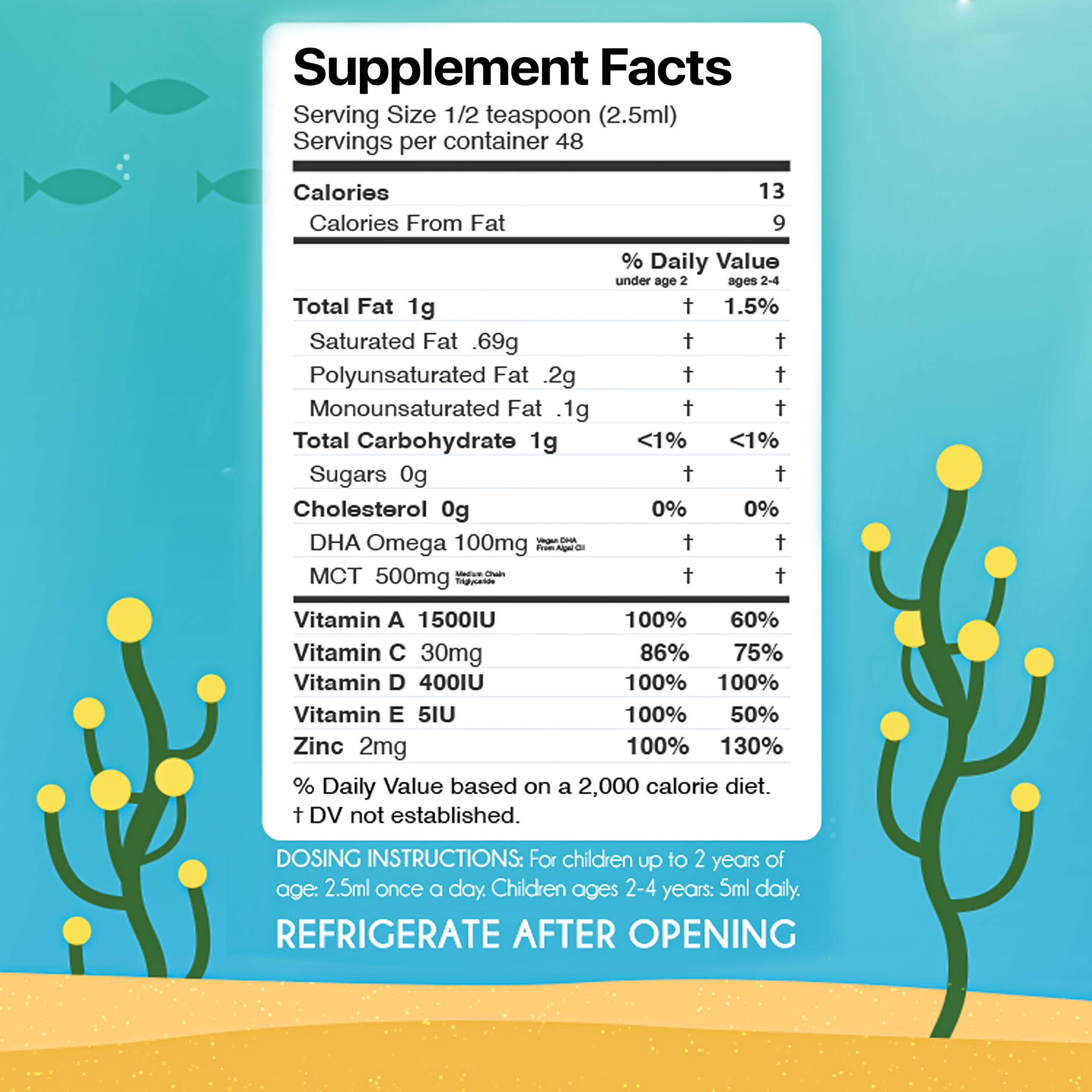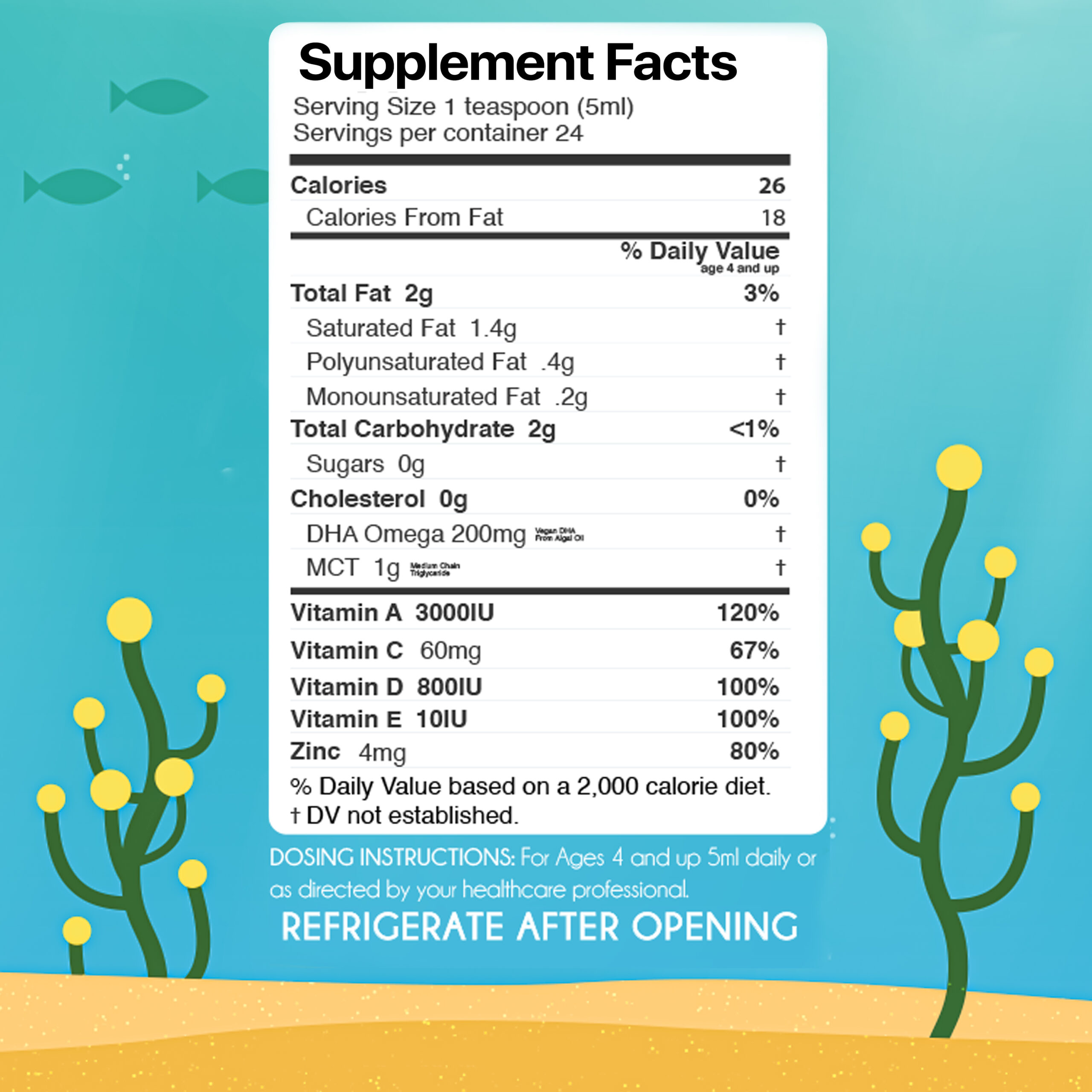Why Is BabyVites So Good?
Every half a teaspoon of BabyVites is loaded with 100mg of DHA, 500mg of MCT (medium chain triglyceride) and the 3 fat soluble vitamins A, D, E. No Sugar!
Omega-3 Fatty Acids (DHA)
What’s this fuss about DHA and is it really that necessary?
Long story short, DHA is kind of a big deal and should be included in your little one’s diet. DHA, also known as Docosahexaenoic acid is a long-chain polyunsaturated fatty acid, that has been found to be a monumental factor not only in fetal brain development but also in the newborn and infant period. What this means is that DHA helps develop your little-one’s brain while in-utero and beyond.
Although there is no recommended daily intake (RDI) for DHA, many experts recommend adults and children consume between 100 mg and 800 mg of DHA a day. Some research shows sufficient daily minimum intake DHA to be around 250mg.
The importance of nutrition in the first 2 years of age cannot be over-emphasized. Baby DHA vitamins have multiple proven benefits for newborns and beyond so supplementation is critical.
Brain Health: DHA serves as a key building block for brain’s cell walls and cell connections. [Source: 1, 2, 3]
Vision Support: The retina, found in the back of the eyeball is a layer of cells that are sensitive to light. Those cells, the rods and cones, trigger nerve impulses that pass via the optic nerve to the brain, where a visual image is formed. DHA is greatly involved in the creation of retinal cells. *Furthermore, many studies have demonstrated a strong correlation between higher infant DHA levels and improved visual acuity in the first 2 years of life. [Source: 4]
Heart health: Both DHA and EPA have anti-inflammatory properties and have been shown to protect the heart. In the long run, these omegas help with reducing blood pressure, reducing bad cholesterol and reducing chances of a heart attack. [Source: 5, ]
Skin Health: Supplementing with omegas has been shown to reduce allergic skin inflammation. [Source: 6]
Supports Focus: Omegas have been shown to help improve inattention and hyperactivity. In mild cases of ADHD taking omegas has been helpful and allowed for reduced doses of stimulant medication. [Source: 7 , 8]
Neurological Support: Children with autism have been found to have low concentrations of Omega 3 Polyunsaturated fatty acids in their brain. Based on current evidence, omega 3 supplementation cannot be recommended as an alternative to support behavioral therapies for autism spectrum disease (ASD) children, but could be used to complement other therapies. [Source: 9]
* These statements have not been evaluated by the Food and Drug Administration. This product is not intended to diagnose, treat, cure, or prevent any disease
Vitamin D
Like DHA, Vitamin D is an essential vitamin that our body doesn’t produce. Vitamin D isn’t just essential for healthy bone growth but it also enhances the immune system, helps with learning and memory and helps manage blood sugar levels. Breastmilk and formula don’t contain sufficient amounts of this vitamin and therefore its supplementation is especially important in the first year of life. Vitamin D absorbs calcium and phosphorus. Low levels of this essential vitamin can cause rickets, a softening and weakening of bones. The American Academy of Pediatrics recommends that all babies receive routine Vitamin D supplementation (400 IU per day) due to decreased sunlight exposure and an increase in rickets. [Source: 12]
Vitamin A
A fat soluble vitamin that plays an important role in vision and bone growth and helps protect the body from infections. It also promotes the health and growth of cells and tissues in the body, particularly those in the hair, nails, and skin. [Source: 13]
Vitamin E
A fat soluble vitamin whose primary role is to reduce hemolytic anemia. It’s particularly important in premature infants and it helps prevent many illnesses especially if mom supplements while pregnant. [Source: 14]
Vitamin C
Due to the human body’s inability to create its own Vitamin C, we need to find other sources for it. Our children traditionally find this from foods, juices, and yes, vitamins!
Vitamin C plays a huge role in the growth and repair of body tissue. It also helps with body functions such as the absorption of iron and our immune system. While Vitamin C deficiencies are rare in the United States it can lead to scurvy. If your child isn’t able to get much fruit in their diet then BabyVites is a great source of Vitamin C for them.
7
Zinc
Zinc is another important component of our body that we can’t make on our own. To get zinc, children must get it from the food they eat or vitamin supplements such as BabyVites. Zinc is another component that contributes towards healthy bones and skin, but can also help your child maintain healthy hair as well.
While Zinc can be consumed from food like whole grains or milk, there are sometimes other elements that can block the amount of zinc you absorb. Supplements like BabyVites can help ensure that your child is getting all the zinc they need. 7



